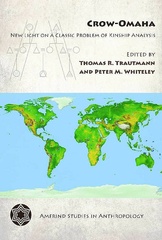
368 pages, 6 x 9
34 illustrations, 3 tables
Paperback
Release Date:20 May 2025
ISBN:9780816555529
The Archaeology of Kinship
Advancing Interpretation and Contributions to Theory
The University of Arizona Press
Archaeology has been subjected to a wide range of misunderstandings of kinship theory and many of its central concepts. Demonstrating that kinship is the foundation for past societies’ social organization, particularly in non-state societies, Bradley E. Ensor offers a lucid presentation of kinship principles and theories accessible to a broad audience. He provides not only descriptions of what the principles entail but also an understanding of their relevance to past and present topics of interest to archaeologists. His overall goal is always clear: to illustrate how kinship analysis can advance archaeological interpretation and how archaeology can advance kinship theory.
The Archaeology of Kinship supports Ensor’s objectives: to demonstrate the relevance of kinship to major archaeological questions, to describe archaeological methods for kinship analysis independent of ethnological interpretation, to illustrate the use of those techniques with a case study, and to provide specific examples of how diachronic analyses address broader theory. As Ensor shows, archaeological diachronic analyses of kinship are independently possible, necessary, and capable of providing new insights into past cultures and broader anthropological theory. Although it is an old subject in anthropology, The Archaeology of Kinship can offer new and exciting frontiers for inquiry.
Kinship research in general—and prehistoric kinship in particular—is rapidly reemerging as a topical subject in anthropology. This book is a timely archaeological contribution to that growing literature otherwise dominated by ethnology.
The Archaeology of Kinship supports Ensor’s objectives: to demonstrate the relevance of kinship to major archaeological questions, to describe archaeological methods for kinship analysis independent of ethnological interpretation, to illustrate the use of those techniques with a case study, and to provide specific examples of how diachronic analyses address broader theory. As Ensor shows, archaeological diachronic analyses of kinship are independently possible, necessary, and capable of providing new insights into past cultures and broader anthropological theory. Although it is an old subject in anthropology, The Archaeology of Kinship can offer new and exciting frontiers for inquiry.
Kinship research in general—and prehistoric kinship in particular—is rapidly reemerging as a topical subject in anthropology. This book is a timely archaeological contribution to that growing literature otherwise dominated by ethnology.
This book fills the intellectual gap between contemporary archaeology and cutting edge understandings of kinship emerging in current ethnographic research.'—Archaeological Review from Cambridge
‘Ensor’s book is a tour de force that is certain to deeply impact the practice of archaeology.’—Peter N. Peregrine, co-author of Anthropology
‘Ensor dares go where few archaeologists have gone for decades when he identifies the study of kinship as a major goal of archaeological research. This is not the archaeological study of kinship of the 1960s and 1970s but rather an approach fully grounded in current post-processual theory.’—David E. Doyel, Arizona Archaeological Society
Bradley E. Ensor is a professor in the Department of Sociology, Anthropology, and Criminology at Eastern Michigan University.
List of Illustrations
Preface and Acknowledgments
I. Introduction
1. Introduction
2. The Importance of Kinship in Archaeology
3. The Hohokam
II. Households
4. Household-Scale Social Organization
5. Archaeological Analysis of Household-Scale Social Organization
6. Hohokam Households
III. Descent Groups
7. Descent Group Organization
8. Archaeological Analysis of Descent Group Organization
9. Hohokam Descent Groups
IV. Marriage, Political Economy, and Transformations
10. The Political Economy of Kinship and Marriage
11. Archaeological Analysis of Marriage and Political Economy
12. Hohokam Marriage, Political Economies, and Transformations
V. Contributions of Kinship Research
13. New Insights on the Hohokam
14. Archaeological Contributions to Kinship Theory
15. New Frontiers in Kinship Research
Glossary
References Cited
Index
Preface and Acknowledgments
I. Introduction
1. Introduction
2. The Importance of Kinship in Archaeology
3. The Hohokam
II. Households
4. Household-Scale Social Organization
5. Archaeological Analysis of Household-Scale Social Organization
6. Hohokam Households
III. Descent Groups
7. Descent Group Organization
8. Archaeological Analysis of Descent Group Organization
9. Hohokam Descent Groups
IV. Marriage, Political Economy, and Transformations
10. The Political Economy of Kinship and Marriage
11. Archaeological Analysis of Marriage and Political Economy
12. Hohokam Marriage, Political Economies, and Transformations
V. Contributions of Kinship Research
13. New Insights on the Hohokam
14. Archaeological Contributions to Kinship Theory
15. New Frontiers in Kinship Research
Glossary
References Cited
Index









